Sungai Segget - Street Food of Johor Bahru
The art of eating, drinking, chatting and gazing along Segget River.
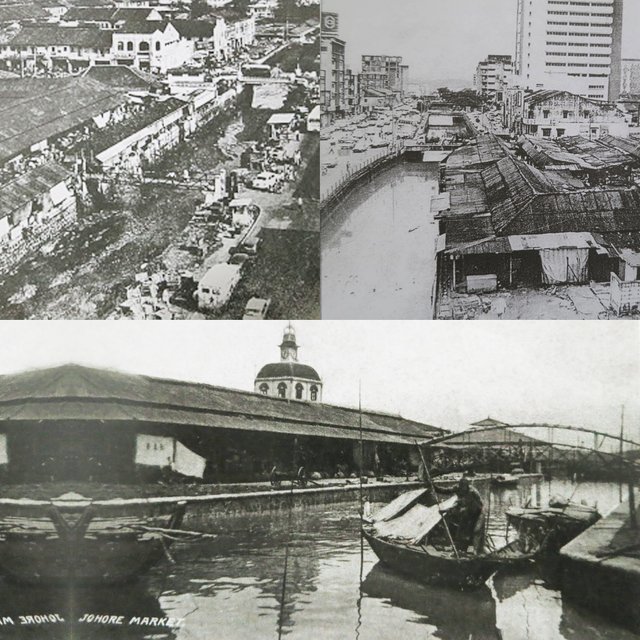
Johore Market at Segget River ( Source: National Archives)
In the past, as more ships began stopping by the straits of Johor, hence more local residents began trading with these international passers-by. The Johor Market was established around this time, where settlers could trade at Segget River. Around 1945, the first food court in JB was set up on a small plot of land adjacent to Segget River. One of the Chinese clans residing in Malaysia fondly called this place ‘Pasak-kia’ which means small market (Peggy Loh, 2016). However, this small market of Segget River is a multi–ethnic, multicultural, and multilingual market considering it was situated next to one of the oldest Indian and Chinese Temple in Johor Bahru. It was once known as JB riverside street food heaven by the locals. Malaysia climate made it hard for social activities to perform under the zinc roof during the day so the food court only came alive after 5pm for customers to dine in and take away. The ideal location provided good accessibility for late afternoon crowds and business would go on till late evening to meet the customer’s supper appetite before bedtime. However, this small riverside street food market was demolished in 1986.
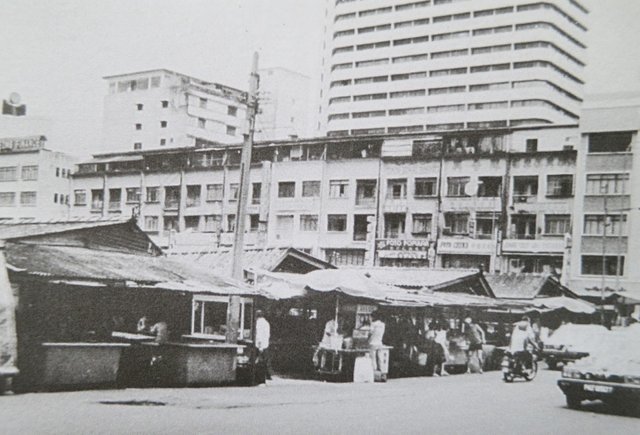
Mobile Stalls parked along Jalan Ungku Puan (Resource: Tiong Hua Association)
For the past decade, Segget River has been facing a growing issue of pollution and labelled as the second most polluted river in Malaysia. This was due to the awful stench emitted by the river due to uncontrolled sewage management by business activities along Segget River. However, the awful stench of the river could be viewed as minor issue comparing to the nostalgic scenery view along Segget River. Mutton soup by Mr. Daud and Mr. Ali were among the memorable stalls around 1970s along the Segget River. Some Singaporeans would agree that once they have had a taste of Indian mutton soup, they could never enjoy Singapore’s mutton soup ever again. The broth was medium bodied and the spice aroma was mild. The spice aroma was present only when someone paid attention to its texture. It was not assertive enough to make its presence felt to the inattentive.
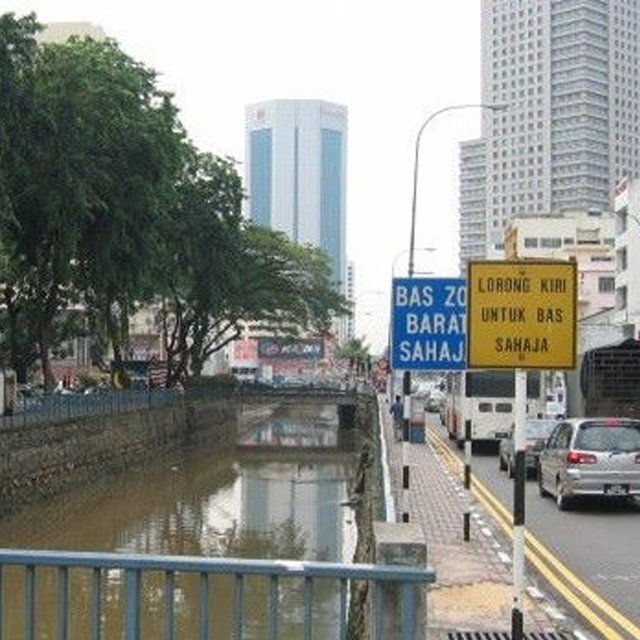
Segget River in 2000s (resource: Berteromber, 2015)
Segget Market has popular Teochew cuisine that originated from Kwantung Province in China. One Teochew staple must with their plain rice porridge, eaten with a variety of dishes that have salty, sour or spicy flavours in contrast. Unlike Cantonese rice porridge which is a smooth gruel, Teochew rice porridge is virtually a watered-down version of boiled rice with grains of fluffy rice in the broth. Most diners would enjoy refreshing sugarcane juice, pressed from sticks of fresh sugarcane through a noisy juice-extractor on the hawker’s mobile stall. Another popular drink was fresh soy bean, served either warm or chilled. Bowls of smooth soy bean, served warm and flavoured with a generous scoop of syrup, were popular desserts. (Peggy Loh, 2016)
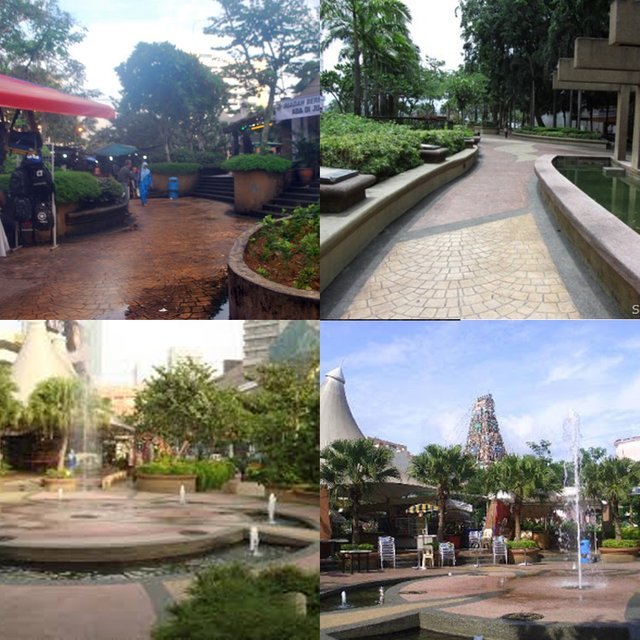
Legaran Segget, Cover-up Landscape above Segget River in 2008 (National Landscape Department, 2008)
Back in the days, people at Segget Market would distinctly remember the unique feature of dining here because when the tide was low, the sewerage dump of Sungai Segget were revealed. At that time, boats no longer plied this waterway but everyone who lived or did business next to the river, used it as a convenient dump. So while regulations for proper waste disposal were not yet developed and enforced, hawkers would dump all manner of refuse into the river. Although Sungai Segget was known as smelly and dirty place at some part of its timeline, this river was the very prominent liveable social node for Johor Bahru city centre.
Since 2004, some of the next generation hawkers have been serving familiar Segget River cuisines at the backlane of Jalan Meldrum, now called Meldrum Walk. Asides from the fact that Meldrum Walk is now the hidden gem of Malaysia authentic dishes, the loss of Segget Market is remorseful for many who recalls the history of Johor Bahru Central Market.
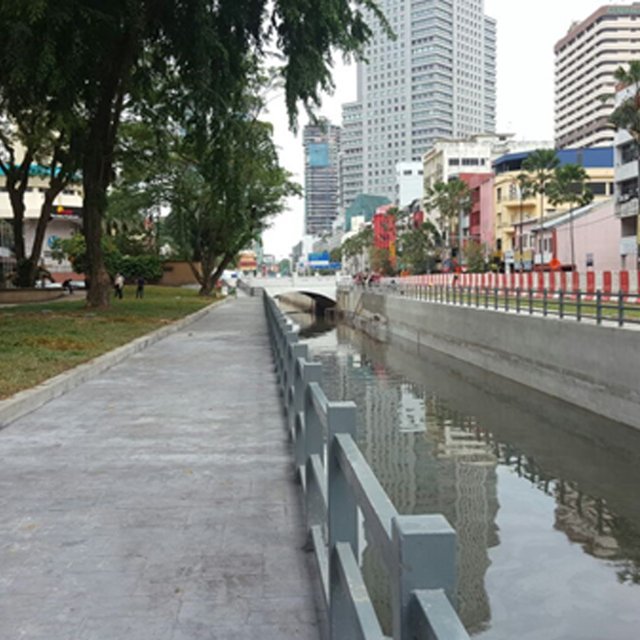
Segget River in 2017
The cover up of Segget River (Legaran Segget), the pedestrian walkway in Johor Bahru, was constructed in 2005 with estimated price of RM6 Million. However in 2015, an initiative under the Johor Bahru Transformation Programme, had eventually led to the digging and uncovering of Sungai Segget in 2017 thus known as Segget river rejuvenation project. The project, led by Iskandar Regional Development Authority (IRDA), is meant to bring back the soul of Sungai Segget to its past glory when the river once flourished with trade ships and small boats. In future, Segget River shouldn’t only be a habitable marine life but could be the very nostalgic social nodes of people in the olden days. Segget River was the social nucleus of Johor Bahru settlements centre. No Segget River and there will be no Johor Bahru cultural spirit in the future.
Co-Authors: Amirul Hakim Jamil, Hakim Onn, Azizah Daud
References:
http://azmi-shuib.blogspot.com/2013/05/daud-soup-kambing-sungai-segget-johor.html
(Azmi Shuib, 2013)
http://www.vishtech.com/templejb/index.php (Temple at Johor Bahru City Centre) (Arulmigu Rajamariamman Devasthanam Johor Bahru)
http://ppunlimited.blogspot.com/2016/06/sungai-segget-jbs-wonder-waterway.html(Peggy Loh, 2016)
http://ppunlimited.blogspot.com/2016/10/memories-of-jbs-first-food-court.html(Peggy Loh, 2016)
https://www.thestar.com.my/news/community/2012/03/29/jalan-wong-ah-fook-stretch-to-reveal-sungai-segget-as-a-major-city-attraction/ (Zasali Musa, 2013)
http://berteromber.blogspot.com/2015/08/sungai-segget.html (Segget in 2000s) (Berteromber, 2015)
https://jalan2cuti2.wordpress.com/2016/09/20/tempat-menarik-di-johor-johor-bahru-alkisah-klasik/ (Pantai Lido and Segget) (Danial, 2016)
http://johorkaki.blogspot.com/2018/07/meldrum-walk-2018-johor-bahrus-back.html (Tony, Johor Kaki 2018)
http://johorkaki.blogspot.com/2014/05/daud-kambing-soup-at-johor-bahru.html (Tony, Johor Kaki 2014)
http://my.geoview.info/main_fountainlegaran_segget_jb_developed_by_national_landscape_department,10412474p (Legaran Segget, JB Developed by National Landscape Department,2008)